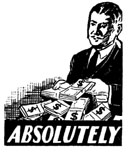
Can Economic Justice Be Achieved Without Law?
FALLEN MAN & FALLEN MONEY-MAKING
The radical difference between the type of life fostered by the Catholic Church and the type of life fostered by the modern world is becoming increasingly clear. In the 1950s it might have seemed that the general culture and the culture of the Faith did not differ in too many respects, but the incongruity between Catholic life and modern secular life is apparent now, both in questions of individual morality and conduct and in the life of society as a whole.
In this essay I want to take a look at a moral issue affecting all of society and every individual: the question of economic activity. Economics has long been a subject of Christian concern. Popes, saints, theologians, and philosophers have given considerable attention to the relation of economics — and its moral dimensions — to the Faith, understanding that economic activity affects other vital matters, above all family life: Can fathers earn enough to support their families without requiring mothers to enter the paid workforce? Will the cost and availability of housing encourage couples to practice artificial birth control?
In economics as in other areas, the Church has to contend with more than one error at a time, for truth is one but error is many. Socialism, for example, has been condemned, and the definitive judgment of Pius XI in 1931 that “No one can be at the same time a sincere Catholic and a true socialist” (Quadragesimo Anno, no. 120) still holds. But here I want to take up another error about economics equally incompatible with Catholicism. This error is succinctly put in the following sentence: “The way to have people make better choices is not to coerce their economic decision-making, but to inform their personal morality.” The writer is Fr. Robert Sirico, president of the Acton Institute, a libertarian think tank in Grand Rapids, Michigan. Let us take a look at the background to this statement, as Fr. Sirico has developed it in his publication, Acton Notes, to understand what it means and why it is wrong.
Fr. Sirico begins his discussion by speaking of economics and its relation to the concept of scarcity. He writes, “Simply put, economics is the study of human action with regard to scarcity,” adding that “Scarcity is one of the inescapable facts of life.” Nor is it unusual to link the notion of scarcity closely with the definition of economics. Standard economics texts do the same. But Fr. Sirico means, as do nearly all economists, not actual scarceness of resources (lack of food or clothing or building materiabpin the world. Rather they are talking about a kind of disproportion. Fr. Sirico says that man’s “wants and desires are always greater than the resources available to meet them; people are forced…to rank their alternatives and choose from those available options.” Scarce resources, he adds, can include not only a lack of money or goods but even a lack of time in which to do everything one might want to do.
You May Also Enjoy
Belloc saw Islam as a Catholic heresy, and a heresy is an evil. Like Calvinistic Protestantism, it overemphasizes the transcendence of God and His "immutable decrees."
Although the Church’s social doctrine is an integral part of her patrimony, it has elicited little interest, even from Catholics.
Any efficient democracy must operate on the principle of subsidiarity, and this holds true in the economic as well as the political sphere.

